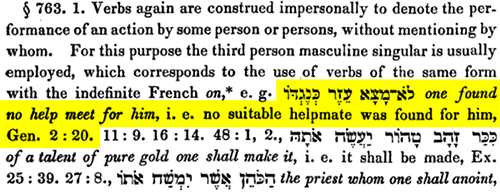(Genesis 2:20, Masoretic) וַיִּקְרָ֨א הָֽאָדָ֜ם שֵׁמֹ֗ות לְכָל־הַבְּהֵמָה֙ וּלְעֹ֣וף הַשָּׁמַ֔יִם וּלְכֹ֖ל חַיַּ֣ת הַשָּׂדֶ֑ה וּלְאָדָ֕ם לֹֽא־מָצָ֥א עֵ֖זֶר כְּנֶגְדֹּֽו׃
(DRB) And Adam called all the beasts by their names, and all the fowls of the air, and all the cattle of the field: but for Adam there was not found a helper like himself.
Virtually all of the English, Greek, and Latin translations translate מצא in this verse as "was found" (passive voice). I find this very surprising, because מצא is in the Qal 3ms form, and the Qal corresponds to the active voice. Normally the Niphal is used for passive voice, so one would expect to see נמצא in Genesis 2:20. What is going on?
Would a more literal translation be, "for Adam he did not find a helper like himself."?
For your answers, please do not just copy and paste long lexicon entries or parallel bible versions unless they are relevant to your argument. I have already referenced the BDB and Gesenius's Hebrew-Chaldee Lexicon, as well as the numerous parallel translations on Biblehub.

